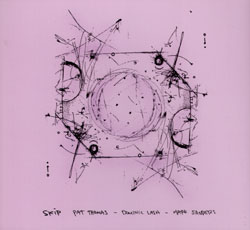
Not your father's standards session.
Here you have Pat Thomas, who first came to public light as part of Derek Bailey's Company weeks and is largely known for his freely improvised electronics (and also piano), Dominic Lash, who you're as likely to find performing music by Wandelweiser composers as executing minutely detailed, ultra-quiet improvs and Mark Sanders, stalwart free jazzer, doing a record of "standards". Odd enough but the choices they make are pretty inspired, not the usual suspects, even when those suspects are culled from more modernist fare (like the endless versions of "Naima" or "Lonely Woman"). Instead, we begin with Sam Rivers' "Beatrice" and come to hear Ornette's "The Blessing", Shorter's "ESP", Monk's "Bright Mississippi", Weston's "Hi-Fly", Joe Henderson's "Recorda Me" and Bird's "Quasimodo". None of them particularly obscure but also rarely the subject of covers. OK, there's "Giant Steps" and "Oleo" too, but even so...
And it works amazingly well. Thomas is wonderfully sensitive and unaffected, Lash, a fantastic player, seems capable of handling almost anything and investing it with depth and Sanders reins in his tendencies toward the overactive and bombastic, the three creating nine fresh and utterly enjoyable approaches to their material. They don't try to over-stretch the music, to impose unnecessary and unwanted avant-gardisms or extended techniques, instead simply treat the themes with love and respect. Why "Beatrice" isn't covered more often becomes an obvious question after hearing the rendition at hand, such a lovely theme and so conducive to improvisation. "Giant Steps" is actually dissected in a fascinating manner, Lash discovering a not-so-obvious three-note sequence that punctuates the familiar theme so as to make it feel at least a little bit new. Thomas displays snatches of early 60s Cecil Taylor during "ESP" and they fit right in, Sanders morphing into his Sunny Murray. Just as you're afraid that the trio is going to succumb to a catch-all of cacophony, they withdraw, wrapping things up unexpectedly but tidily. One of the virtues of this recording is that they never overplay their hand, always cut matters to an exquisite length, leaving the listener wanting just a bit more. Perhaps "Hi-Fly" gets the freest treatment, the three swirling about for several minutes until a ghost of the theme enters via the bass and is picked up by piano before playing out once more into a free torrent. It's a unique reading, less vivacious than the original but more turbulent and troubled � quite compelling. When "Quasimodo" completes the set, with Lash setting up an odd but irresistible pointillist, single-note punctuation and Thomas cavorting like some pianistic Steve Lacy, the listener is satisfied and happy, having experienced 51 minutes of sheer, inventive fun. Highly recommended.
Comments and Feedback:



More Recent Reviews, Articles, and Interviews @ The Squid's Ear...


|

